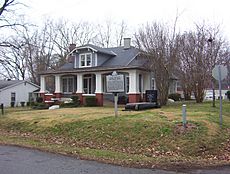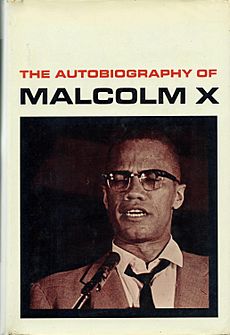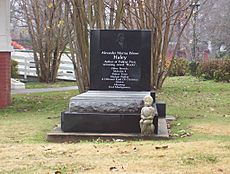Alex Haley facts for kids
Quick facts for kids
Alex Haley
|
|
|---|---|
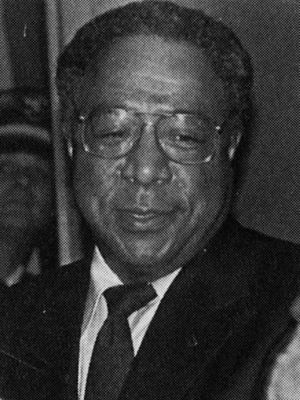
Haley in 1980
|
|
| Born | Alexander Murray Palmer Haley August 11, 1921 Ithaca, New York, U.S. |
| Died | February 10, 1992 (aged 70) Seattle, Washington, U.S. |
| Occupation | Writer |
| Education | Alcorn State University Elizabeth City State University |
| Spouse | Nannie Branch (1941–1964) Juliette Collins (1964–1972) Myran Lewis (1977–1992) (his death) |
Alexander Murray Palmer Haley (born August 11, 1921 – died February 10, 1992) was an American writer. He is best known for his 1976 book Roots: The Saga of an American Family.
The ABC made Roots into a TV miniseries in 1977. It was watched by a huge audience of 130 million people. In the United States, this book and miniseries helped people learn more about Black American history. It also made many people interested in finding out about their own family history.
Haley's first famous book was The Autobiography of Malcolm X, published in 1965. He wrote it after many long talks with Malcolm X, a famous civil rights leader.
When Alex Haley passed away, he was working on another family history novel. He had asked a screenwriter named David Stevens to finish it. This book was published as Queen: The Story of an American Family. It was also made into a miniseries called Alex Haley's Queen in 1993.
Contents
Early Life and Education
Alex Haley was born in Ithaca, New York, on August 11, 1921. He was the oldest of three brothers. His family lived in Henning, Tennessee, before moving back to Ithaca when he was five.
Haley's father, Simon Haley, was a professor of agriculture. His mother, Bertha George Haley, grew up in Henning. Alex Haley's family had roots from different places, including Mandinka people, other African groups, Cherokee people, and people from Scotland and Ireland. Alex Haley was always proud of his father and how he overcame challenges like racism.
Like his father, Alex Haley went to Alcorn State University, a college mainly for Black students in Mississippi. A year later, he went to Elizabeth City State College in North Carolina. He left college the next year. His father thought Alex needed more discipline and encouraged him to join the military. On May 24, 1939, Alex Haley started a 20-year career in the United States Coast Guard.
Later, Haley used family research to trace his mother's family back to Jufureh, a village in The Gambia, Africa.
Coast Guard Career
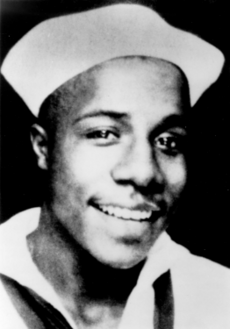
Haley first joined the Coast Guard as a mess attendant, which meant he helped serve food. He was later promoted to a "petty officer third-class" in the "steward" role. This was one of the few jobs open to Black people at that time.
While serving in the Pacific Ocean during World War II, Haley taught himself how to write stories. Other sailors often paid him to write love letters to their girlfriends. He said that the biggest challenge during their long trips was not the enemy, but boredom.
After World War II, Haley asked the U.S. Coast Guard if he could work in journalism. By 1949, he became a "petty officer first-class" as a journalist. He later became a "chief petty officer" and stayed in this rank until he retired from the Coast Guard in 1959. He was the first chief journalist in the Coast Guard. This job was specially created for him because he was such a good writer.
The U.S. Coast Guard honored Haley by naming a ship after him. In July 1999, the cutter formerly known as USS Edenton was renamed USCGC Alex Haley. This ship now serves from Kodiak, Alaska.
Literary Career
After leaving the U.S. Coast Guard, Haley started a new part of his writing career. He became a senior editor for Reader's Digest magazine. He wrote an article for the magazine about his brother George's efforts to become one of the first Black students at a law school in the South.
The Autobiography of Malcolm X
The Autobiography of Malcolm X, published in 1965, was Alex Haley's first book. It tells the story of Malcolm X's life and his ideas. Haley also wrote an ending for the book, explaining what happened at the end of Malcolm X's life, including his assassination.
Haley wrote The Autobiography of Malcolm X by interviewing Malcolm X more than 50 times between 1963 and 1965. Haley was like a ghostwriter for the book, meaning he wrote it in Malcolm X's voice. The two men first met in 1960 when Haley wrote an article about the Nation of Islam for Reader's Digest.
At first, the interviews were difficult. Malcolm X talked mostly about the leader of the Nation of Islam, not about himself. Haley had to remind him that the book was about Malcolm X. After several meetings, Haley asked Malcolm X to talk about his mother. This question helped Malcolm X start telling his own life story.
The Autobiography of Malcolm X has been a very popular book since it was published. By 1977, six million copies had been sold. In 1998, Time magazine called it one of the 10 most important nonfiction books of the 20th century.
In 1966, Haley received the Anisfield-Wolf Book Award for The Autobiography of Malcolm X.
Roots
In 1976, Haley published Roots: The Saga of an American Family. This novel was based on his own family's history, going back to the time of slavery. The story begins with Kunta Kinte, who was taken from The Gambia in 1767 and brought to America to be sold as a slave.
Haley said he was a seventh-generation descendant of Kunta Kinte. He spent twelve years researching, traveling, and writing the novel. He visited the village of Juffure in Gambia, where Kunta Kinte grew up. There, he listened to a tribal historian, called a griot, tell the story of Kinte's capture. Haley also looked at records of the ship, The Lord Ligonier, which he believed carried his ancestor to America.
Haley said the most emotional moment of his life was on September 29, 1967. He stood in Annapolis, Maryland, at the place where his ancestor arrived from Africa in chains exactly 200 years before. A memorial showing Haley reading to children has since been built in Annapolis.
Roots was published in 37 languages. Haley won a special Pulitzer Prize for the book in 1977. That same year, Roots was made into a very popular TV miniseries by ABC. The show was watched by a record 130 million viewers.
Roots showed that Black Americans have a long history, and that this history is not completely lost. Its popularity also made many more people interested in learning about their own family trees.
In 1979, ABC aired a follow-up miniseries called Roots: The Next Generations. This show continued the story of Kunta Kinte's descendants. It ended with Haley's trip to Juffure. In 2016, History aired a remake of the original miniseries.
Haley was a "writer in residence" at Hamilton College in Clinton, New York, where he started working on Roots.
Plagiarism Lawsuits and Other Criticism
Roots faced some lawsuits claiming that parts of it were copied from other works. One lawsuit was dismissed, but another by Harold Courlander was successful. Courlander's novel The African tells the story of an African boy captured by slave traders. Haley admitted that some parts of The African had appeared in Roots. He settled the case out of court in 1978.
Some experts who study family history have also questioned Haley's research in Roots. They found that the Gambian griot (tribal historian) might not have been a real griot. Also, the story of Kunta Kinte might have been a case where Haley's own words were repeated back to him. This means the story might not have been an independent historical account.
Even with these questions, Roots is still seen as a very important work. Dr. Henry Louis Gates, Jr., a professor at Harvard University, said in 1998 that Roots is "a work of the imagination rather than strict historical scholarship." This means it's a powerful story, even if every detail isn't historically proven.
Later Life and Death
In the late 1970s, Haley started working on a second historical novel. This book was based on another part of his family, traced through his grandmother Queen. She was the daughter of a Black enslaved woman and her white master.
He did not finish this novel before he passed away in Seattle, Washington, from a heart attack on February 10, 1992. He was buried next to his childhood home in Henning, Tennessee.
As he wished, the novel was finished by David Stevens and published as Alex Haley's Queen. It was later made into a miniseries in 1993.
Late in his life, Haley bought a small farm in Clinton, Tennessee. After he died, the farm was sold to the Children's Defense Fund (CDF). This group now calls it the Alex Haley Farm. They use the farm as a training center and retreat. An old barn on the farm was rebuilt into a library for the CDF.
Awards and Recognition
- In 1977, Haley won The Pulitzer Prize for Roots. The prize recognized it as "The story of a black family from its origins in Africa through seven generations to the present day in America."
- In 1977, Haley received the Spingarn Medal from the NAACP. This award was for his deep research and writing skill in Roots.
- In 1999, the Coast Guard honored Haley by naming the cutter USCGC Alex Haley after him.
- The U.S. Coast Guard gives out the Chief Journalist Alex Haley Award each year. It is named after him because he was the first chief journalist in the Coast Guard. This award recognizes writers and photographers who share the Coast Guard's story.
Works
- The Autobiography of Malcolm X (1965), a biography
- Super Fly T.N.T. (1973), a movie script
- Roots: The Saga of an American Family (1976), a novel
- Alex Haley Tells the Story of His Search for Roots (1977) – a recording of a lecture
- Palmerstown, U.S.A. (1980–1981), a TV series
- A Different Kind of Christmas (1988), stories
- Queen: The Story of an American Family (1992), a novel
- Mama Flora's Family (1998), a novel
Legacy
Collection of Alex Haley's Personal Works
The University of Tennessee Libraries in Knoxville, Tennessee, has a collection of Alex Haley's personal writings. These include his notes, outlines, research, and legal papers related to Roots up to 1977.
Parts of Alex Haley's collection are also at the African-American Research Library and Cultural Center in Fort Lauderdale, Florida.
Kunta Kinte-Alex Haley Memorial
In Annapolis, Maryland, there is a memorial at the city dock. It marks the place where Kunta Kinte arrived in 1767. This monument, built in 2002, also celebrates the importance of preserving African-American heritage and family history.
See Also
 In Spanish: Alex Haley para niños
In Spanish: Alex Haley para niños
- Alex Haley House and Museum
 | Misty Copeland |
 | Raven Wilkinson |
 | Debra Austin |
 | Aesha Ash |


